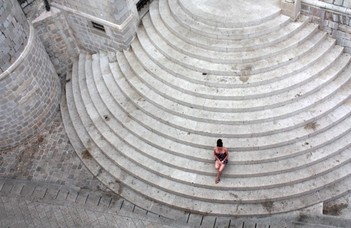Szabadon látogatható előadások az épített örökségről
(for English version please click on English at the top of the page)

Szeret történeti városokban sétálni? Szívesen látogat örökségi helyszíneket és régi épületeket? Érdekli, hogyan őrzik meg, mutatják be és használják az épített örökséget, mint gazdasági és társadalmi erőforrást és hogyan növeli az emberek jóllétét?
Ha szeretné tudni, hogyan értékelik a múlt fizikai emlékeit a szakemberek és a társadalom, és szeretné megismerni a történeti épületek és helyszínek megőrzésének és kezelésének különböző kulturális szemléletét, akkor jöjjön el előadásainkra! Számos rendhagyó megközelítésről is hallhat az örökség által vezérelt innovációról, a történeti épületek adaptív újrahasznosításáról és a helyi közösségekre gyakorolt hatásairól. Az eseménysorozaton interdiszciplináris tudományterületekről érkező nemzetközi - európai, ázsiai, észak- és dél-amerikai - örökségvédelmi szakemberek adnak elő.
DROP-IN ONLINE LECTURES SCHEDULE
|
|
Date |
Lecturer |
Topic |
|
1. |
March 17. 10:00-11:30 |
dr. Aziliz Vandesande |
Heritage-led innovation. A new dimension of research and mapping activities in which heritage is used to drive territorial sustainable development and cultural exchanges. |
|
2. |
March 24. 10:00-11:30 |
dr. Joanna Sanetra Szeliga |
Heritage and well-being. The quality of life and wealth are no longer measured solely based on countries' GDPs. Studies show that both individual and social wellbeing is related to more than monetary values. How does the historic environment contribute to increasing people’s quality of life? |
|
3. |
March 31. 10:00-11:30 |
Tokiko Onaka |
Cultural differences between east and west in the meaning of heritage and the approach to historic building preservation: the Japanese approach. |
|
4. |
April 7. 10:00-11:30 |
Rand Eppich PhD |
Economic and social development utilizing cultural heritage. What impacts do historic places have on the local community and economy? |
|
5. |
April 21. 10:00-11:30 |
dr. Bie Plevoets |
Adaptive reuse of heritage buildings. How to find new functions for old buildings to suit contemporary needs yet preserve their authenticity and sense of age? Discovering the narrative of the existing building and finding a new balance between different sets of values. |
|
6. |
April 28. 10:00-11:30 |
Graham Bell |
Cultural heritage management and European initiatives to place heritage in the heart of societies. A values-based overview of cultural heritage as a synthesis and expression of social identity. |
|
7. |
May 5. 10:00-11:30 |
dr. Ona Vileikis Tamayo |
World heritage, Historic Urban Landscapes, and the importance of Heritage Impact Assessments. |
|
8. |
May 12. 14:00-15:30 |
dr. Veronica Heras |
Monitoring of heritage sites: methods and challenges through the example of Cuenca and rural contexts (Cantón Nabón). |

